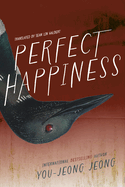
Perfect Happiness, Korean novelist You-Jeong Jeong's third psychological thriller to be translated into English after The Good Son and Seven Years of Darkness, expertly constructs a terrifying labyrinth, littered with corpses, from which some of the innocent might escape. Sean Lin Halbert deftly translates Jeong's multilayered, polyphonic, shocking reveals.
At the epicenter of Jeong's intricate web of characters is Yuna, her many roles revealed in relation to others--mother, wife, stepmother, ex-wife, sister, sister-in-law, daughter. Yuna's daughter, Jiyoo, is her barometer; as young as kindergartener Jiyoo is, she's painstakingly learned to read Yuna's tiniest movements, hyperaware of the looming punishment for disobedience. Jiyoo's horrific nightmares reveal unbearable truths but Jiyoo can't risk the very real threat of being thrown out alone. When her beloved father, Joon-young, breaks his promise to return and disappears, Jiyoo can't control her fear. Why is her five-year-old stepbrother suddenly not breathing? Has Aunt Jane also vanished? "Happiness is subtraction," Yuna's second husband, Eun-ho, remembers Yuna saying. "It's getting rid of the possibility of unhappiness until life becomes perfect." What he thought was a path to "that perfect happiness" should have been his warning to get away.
"Trust no one," a character rightfully warns. Jeong's meticulous plotting continuously intensifies until the epilogue finally separates the living from the dead. Equally chilling is Jeong's author's note, her "first time admitting" to the "irreparable wounds" she suffered in a relationship that provided "the seed of this story." While Jeong insists Yuna's voice is never heard, her power to damage and destroy reverberates to the very end. --Terry Hong

